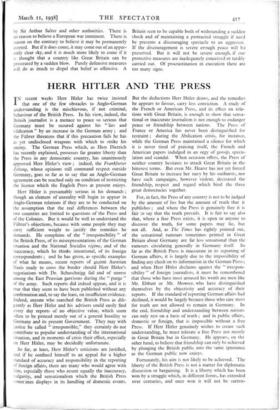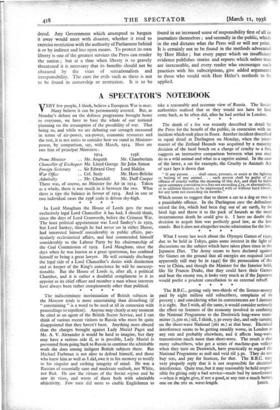HERR HITLER AND THE PRESS IN recent weeks Herr Hitler
has twice insisted that one of the few obstacles to Anglo-German understanding is the mischievous, if not criminal, behaviour of the British Press. In his view, indeed, the British journalist is a menace to peace so serious that Germany must be secured against his " lies and vilification " by an increase in the German army ; and the Fiihrer threatens that if this precaution fails he has as yet undisclosed weapons with which to strike his enemy. The German Press which, as Herr Dietrich has recently explained, possesses far greater liberty than the Press in any democratic country, has unanimously approved Herr Hitler's view ; indeed, the Frankfurter Zeitung, whose opinions still command respect outside Germany, goes so far as to say that an Anglo-German agreement can be reached only on condition of restricting the licence which the English Press at present enjoys.
Herr Hitler is presumably serious in his demands ; though an element of unreality will begin to appear in Anglo-German relations if they are to be conducted on the assumption that the real differences between the two countries are limited to questions of the Press and of the Colonies. But it would be well to understand the Fiihrer's objections, because with some people they may carry sufficient weight to justify the remedies he demands. He complains of the " irresponsibility " of the British Press, of its misrepresentations of the German situation and the National Socialist regime, and of the inaccuracy, which he thinks intentional, of its foreign correspondents ; and he has given, as specific examples of what he means, recent reports of 40,000 Austrian Nazis ready to cross the border should Herr Hitler's negotiations with Dr. Schuschnigg fail and of unrest among the East Prussian garrisons during the " purge " of the army. Such reports did indeed appear, and it is true that they seem to have been published without any confirmation and, to say the least, on insufficient evidence. Indeed, anyone who searched the British Press as dili- gently as Herr Hitler and his advisers could easily find every day reports of no objective value, which seem often to be printed merely out of a general hostility to Germany and its present Government. They may with ,ustice be called " irresponsible," they certainly do not contribute to popular understanding of the international situation, and in moments of crisis their effect, especially on Herr Hitler, may be decidedly unfortunate.
So far, at least, Herr Hitler's criticisms are justified, and if he confined himself to an appeal for a higher standard of accuracy and responsibility in the reporting of foreign affairs, there are many who would agree with him, especially those who resent equally the inaccuracy, vulgarity, and sensationalism which the British Press sometimes displays in its handling of domestic events. But the deductions Herr Hitler draws, and the remedies he appears to favour, carry less conviction. A study of the French or American Press, and its effect on rela- tions with Great Britain, is enough to show that sensa- tional or inaccurate journalism is not enough to endanger peace or friendship between nations. The Press of France or America has never been distinguished for restraint ; during the Abdication crisis, for instance, while the German Press maintained a silence for which it is never tired of praising itself, the French and American papers indulged in an orgy of gossip, specu- lation and scandal. When occasion offers, the Press of neither country hesitates to attack Great Britain in. the bitterest terms. But even Mr. Hearst has not yet forced Great Britain to increase her navy by his outbursts, nor have such campaigns, however violent, decreased the friendship, respect and regard which bind the three great democracies together.
For, in fact, the Press of any country is not to be judged by the amount of lies but the amount of truth that it publishes ; and where the Press is genuinely free it is fair ln say that the truth prevails. It is fair to say also that, where a free Press exists, it is open to anyone to discover the truth, for some papers may lie, but not all. And, as The Times has rightly pointed out, the sensational rumours sometimes printed in Great Britain about Germany are far less sensational than the rumours circulating generally in Germany itself. So far as the British Press is inaccurate in its reporting of German affairs, it is largely due to the impossibility of finding any check on its information in the German Press; and when Herr Hitler declaims against the " irrespon- sibility " of foreign journalists, it must be remembered that those who have most aroused his wrath are men like Mr. Ebbutt or Mr. Mowrer, who have distinguished themselves by the objectivity and accuracy of their reports. If the standard of reporting German affairs had declined, it would be largely because those who care most for truth are not allowed to remain in Germany. In the end, friendship and understanding between nations can only rest on a basis of truth ; and in public affairs, domestic or foreign, that is impossible without a free Press. If Herr Hitler genuinely wishes to create such understanding, he must tolerate a free Press not merely in Great Britain but in Germany. He appears, on the other hand, to believe that friendship can only be achieved by plunging the British public into the same ignorance as the German public now enjoys.
Fortunately, his aim is not likely to be achieved. The liberty of the British Press is not a matter for diplomatic discussion or bargaining. It is a liberty which has been won by a struggle which, in different forms, has extended over centuries, and once won it will not be surten- dered. Any Government which attempted to bargain it away would meet with disaster, whether it tried to exercise restriction with the authority of Parliament behind it or by indirect and less open means. To protect its own liberty is one of the greatest services the Press can render the nation ; but at a time when liberty is so gravely threatened it is necessary that its benefits should not be obscured by the vices of sensationalism and irresponsibility. The cure for evils such as these is not to be found in censorship or restriction. It is to be found in an increased sense of responsibility first of all in journalists themselves ; and secondly in the public, which in the end dictates what the Press will or will not print. It is certainly not to be found in the methods advocated by Herr Hider ; but every paper which on insufficient evidence publishes stories and reports which unless true are inexcusable, and every reader who encourages such practices with his subscriptions, give added argument; to those who would wish Herr Hitler's methods to be applied.











































 Previous page
Previous page